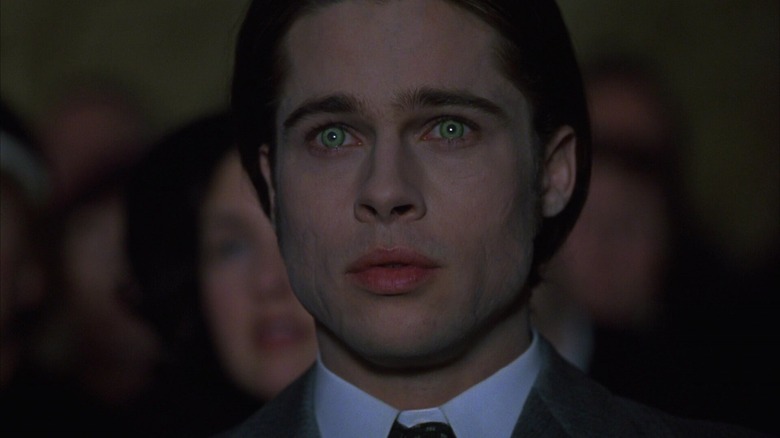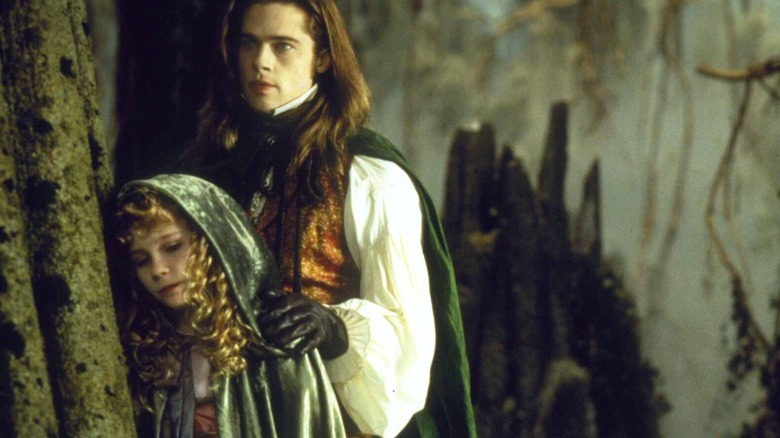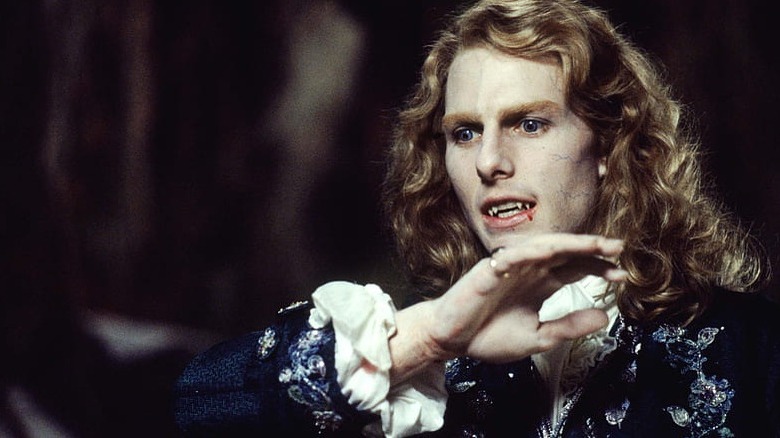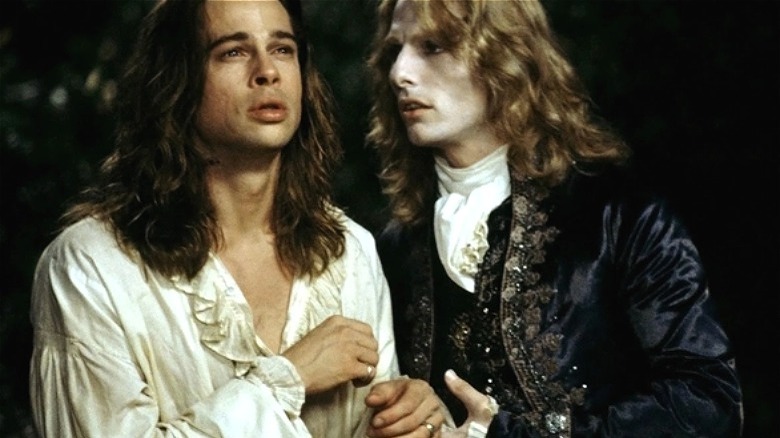Why Brad Pitt Was Miserable Filming Interview With The Vampire
The first book in Anne Rice's "The Vampire Chronicles," "Interview with the Vampire," tells a cautionary tale about the horrors of immortality as a vampire. Told from the perspective of a vampire named Louis de Pointe du Lac, "Interview with the Vampire" is the story of a mortal man who is turned into a creature of the night by the dangerous, unpredictable Lestat, whom Louis both loves and abhors.
The 1994 film adaptation of the book, also titled "Interview with the Vampire," brought this romantic, sordid tale to life, with Tom Cruise and Brad Pitt playing Lestat and Louis, respectively. The film spotlighted the macabre aspects of Rice's novel with its gothic setting, and Cruise's measured interpretation of Lestat's complex cruelty acts as the beating pulse of the story. The narrative also includes the vampire child Claudia (Kirsten Dunst), whose physical frame cannot keep up with her psychological maturity, leading to several events that end in tragedy.
However, it is Pitt's Louis who acts as a catalyst for the horror tale to be told at all, and the actor invests the character with a sense of tortured resignation. In an interview with Entertainment Weekly, Pitt revealed that part of the reason he looked so "miserable" as Louis was that he felt that way during filming "Interview with the Vampire."
Six months of endless dread
Pitt told EW that shooting in the relentless dark during the middle of winter in London was a contributing factor to his on-screen gloom:
"I am miserable. Six months in the f***ing dark...We get to London, and London was f***ing dark. London was dead of winter. We're shooting in Pinewood, which is an old institution... There's no windows in there. It hasn't been refabbed in decades. You leave for work in the dark — you go into this cauldron, this mausoleum — and then you come out and it's dark. I'm telling you, one day it broke me."
Pitt's feelings about shooting inside windowless rooms translated onto the screen, adding a more complex quality to Louis' predicament, who genuinely seems trapped with the immortality he has to contend with. After all, the world of "Interview with the Vampire" is dark and dreary due to its themes of misery and violence that go hand in hand with immortal life.
This darkness also extended to the film's locations, as vampires are primarily predators who come out at night, and the sunlight is fatal to them. As a result, most of the film's locations, including New Orleans, were gloomy alleyways and candle-lit interiors. As the scenery shifted, the scenes featured catacombs and underground crypts, which served as coffins for the undead. Also, later in the film, when Claudia and Louis travel overseas, they are confined to windowless chambers for months on end as a part of their voyage to seek out more of their kind.
The legacy of Lestat looms over the film
Per Pitt, he signed on to the film prior to reading the script, based on his appreciation for Rice's rendition of Louis as a character. Louis is a mass of contradictions both in the book and the film: he was a plantation owner who underwent horrors after losing loved ones and was preyed on by Lestat during a vulnerable point in his life. Lestat offered him the choice to become immortal. Throughout the many years, Louis lives on, or has to live on, he struggles with his identity. On the one hand, he's a vampire, and his existence depends on sucking the life force out of humans. On the other hand, he's empathetic towards humans and desperately clings to his own humanity, acting as an antithesis to the cruel, unpredictable Lestat, who is comfortable with the predatory aspects of being a vampire.
Pitt elaborated on this aspect, and believes that Lestat's legacy overshadows the film, which reduced Louis' character to a passive one:
"There was no script. I knew the book, and in the book you have this guy asking, 'Who am I? Am I of the angels? Am I of the devil?' In the book, it is a guy going on this search of discovery. And in the meantime, he has this Lestat character that he's entranced by and abhors. But then I got the script two weeks before we started shooting...In the movie, they took the sensational aspects of Lestat and made that the pulse of the film, and those things are very enjoyable and very good, but for me, there was just nothing to do — you just sit and watch."
Why Pitt's Louis du Lac is integral to Interview with the Vampire
It is undeniable that Lestat as a character overshadows Louis, even in the book. The delicious evil and mystique of Lestat is a connecting thread throughout Rice's "The Vampire Chronicles," and it is understandable why Pitt feels that his character did not have much to do when compared to Cruise's Lestat. However, "Interview with the Vampire" is exclusively Louis' tale, as he is the one relaying it to a reporter as a means of alerting humanity and searching for his own salvation. Although Lestat remains electrifying and dominates the course of events in the film, it is Louis who acts as a relatable, humane grounding point for audiences. He's a mortal-turned vampire stuck with an irrevocable decision and does his best to shed away a life of violence, including his lover and maker, Lestat.
There's pathos and grief to the tale that is contributed solely by Louis, but his inability to convey it convincingly leads to yet another failure in the end. The interviewer (played by Christian Slater) begs Louis to turn him after he tells his story, which defeats the very purpose of the cautionary tale. Vampirism, which carries both sexual and violent connotations, remains an appealing lure for humanity, despite the existential dread that comes with the prospect of a doomed, immortal life. Although Louis cannot do anything to change this, he has relayed his perspective of events and revealed his empathetic, tortured nature in the process.
Louis, as a protagonist, allows us a glimpse into a life we will never know. It is a cry for help, as Louis can do nothing but adapt to loss and grief forever. This inevitable tragedy is the painful, emotional crux of "Interview with the Vampire."



